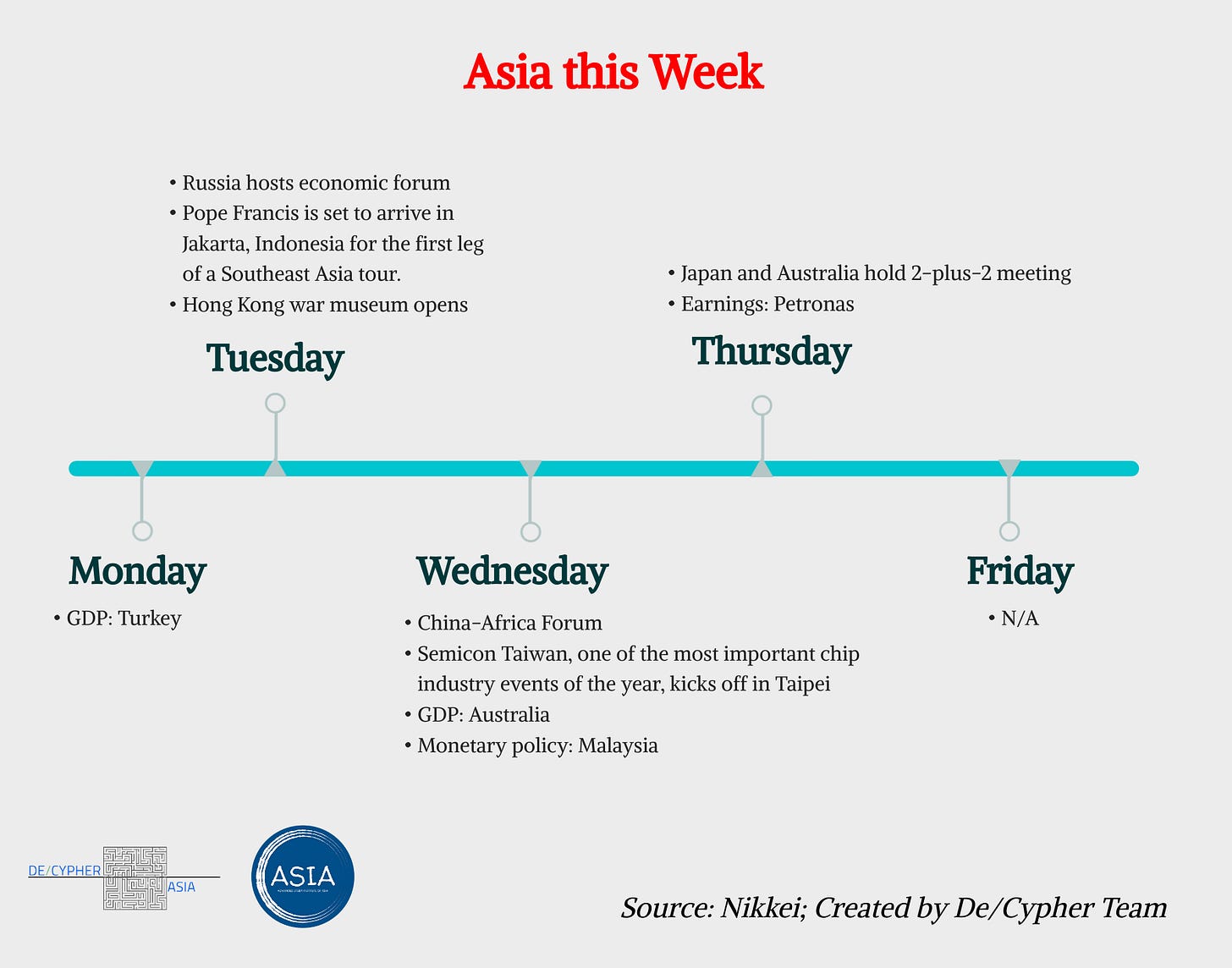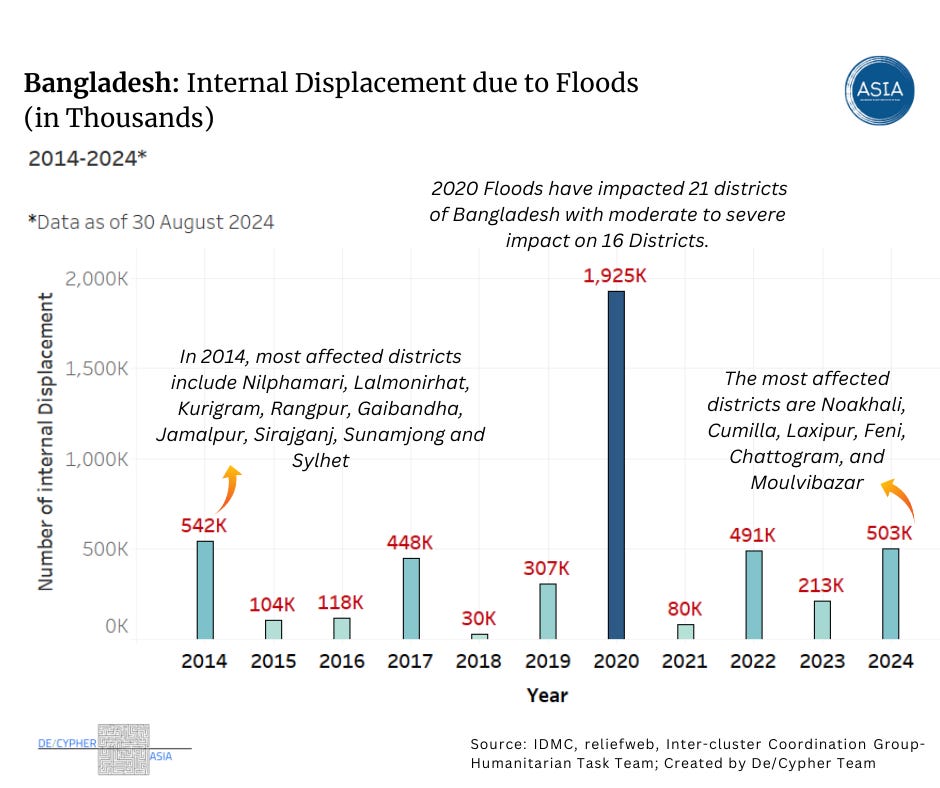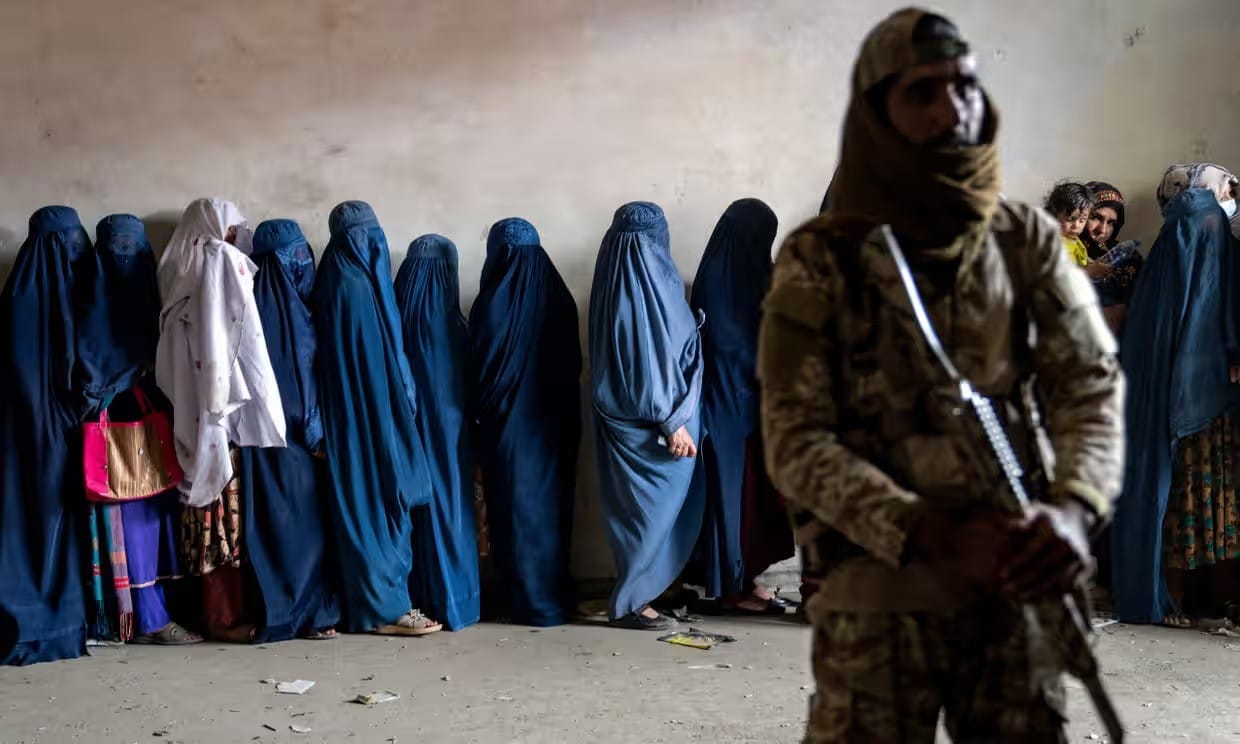"The Othering of Women by Taliban, Doctors' Strike in Bangladesh, and Declining Inflation in Pakistan"
This edition of De/Cypher looks at how women in Afghanistan have been impacted by changes in the law by the Taliban and the developments in Pakistan and Bangladesh across this week.
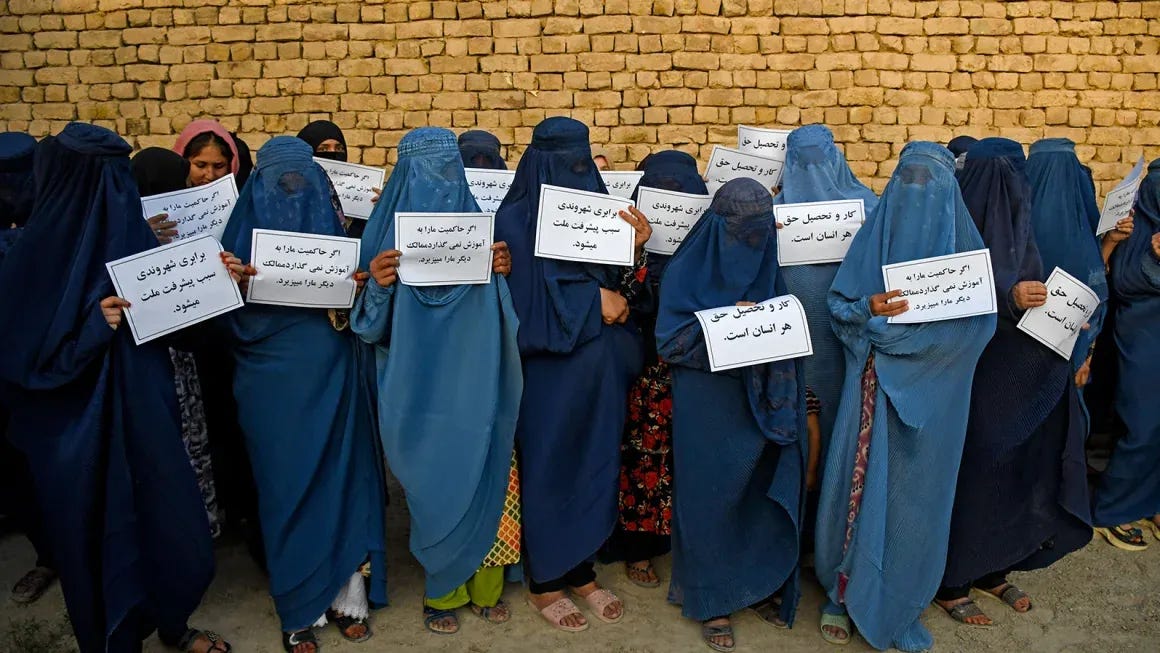
De/Cypher Data Dive 📈
Bangladesh is among the most climate-vulnerable nations in the world. Recent flash floods caused by Bangladesh's heavy rainfall have severely damaged communities in 11 districts in the country's eastern regions.
Asia View🌏
The Othering of Women by Taliban
Written by Priyanka Garodia, Geopolitical Research Analyst - South Asia
The Taliban's return to power in Afghanistan in 2021 has had a devastating impact on the country's social, political, and civic landscape, particularly for women. Since, the return of the Taliban there has been a systematic and brutal erosion of women’s rights characterised as a ‘Gender Apartheid’. The term is often used to describe a regime that institutionalises gender discrimination and segregation. (Mayer, 2000) Afghanistan presently faces a gender apartheid with women being relegated to the margins of society justified because of religion and culture. The Taliban’s radical interpretation of Islamist ideology and policies have systematically eroded the rights and freedoms of Afghan women, relegating them to the periphery of public life. The extent of gender discrimination in Afghanistan is pervasive, with women facing significant barriers in accessing education, healthcare, economic opportunities, and political representation. The Taliban's actions have not only stripped Afghan women of their fundamental rights but have also entrenched a patriarchal system that seeks to erase their presence from public life.
The Legal Framework of Oppression in Taliban
The Ministry for the Propagation of Virtue and Prevention of Vice is a wing of the Taliban government that has played an instrumental role in curtailing the rights of women. With over 100 directives, the ministry ensures that the draconian laws of the government are enforced and followed. These decrees include banning women from attending high school and university, restricting their movement without a male guardian, and preventing them from working in both public and private sectors. Restrictions include women’s voices not being used in public to not singing in homes. (Ahmadi, 2022; Sadr, 2024). These restrictions have not only deprived women of their right to education and employment but have also effectively confined them to their homes, thereby reinforcing a system of gender-based segregation based on traditional patriarchal norms.
The subordination of women under the Taliban regime is defended on the grounds of religion and culture, with these policies being presented as the dictates of Islam. However, the rules enforced by the Taliban have been widely contested by Islamic scholars and human rights advocates who argue that the Taliban's version of Sharia law is a distortion of Islamic teachings. Sharia Law emphasize justice, equality, and the dignity of all human beings, regardless of gender. (Mayer, 2000) Instead, the Taliban’s interpretation of the law reflects an interpretation seeped in misogyny that aims at controlling women.
The impact on Education and Employment
Afghan women and girls have been denied the right to education under the Taliban. The impact of this ban has been severe and immediate. Girls have been banned from attending secondary schools, and women have been barred from tertiary education, effectively reversing the progress made in the two decades prior to the Taliban's return to power (United Nations Human Rights Office of the High Commissioner, 2023). The denial of women’s education is a clear violation of women’s right to education as enshrined in the Human Rights Laws. The ban on education while having dire effects on the present condition of women in society, also have far reading impact on the future of Afghan women. Women are being denied the opportunity to acquire the skills and knowledge necessary to participate in the workforce and contribute to the country's development reinforcing their marginalisation.
The ban on women's employment in non-governmental organizations (NGOs) and other sectors further exacerbates this marginalization. Women who were previously employed in various sectors, including healthcare, education, and public administration, have been forced out of their jobs, leading to a significant increase in poverty and economic dependency (Ahmadi, 2022). The exclusion of women from the workforce not only undermines their economic independence but also deprives Afghanistan of the contributions of half of its population, thereby hindering the country's overall development.
Femicide and Gender-Based Violence
There has been a sharp increase in the cases of gender-based violence and femicides in Afghanistan since the Taliban takeover in 2021. The Centre of Information Resilience’s Afghan Witness programme has reported over 300 cases of femicide since 2021. Nearly 840 women and girls have been subject to gender-based violence in Afghanistan, and many cases go unreported due to fear and the absence of legal protections. (Halaimzai & Theros, 2024) The figures while alarming only represents a portion of the actual violence occurring against women in Afghanistan and point to a lack of legal protection and judicial processes due to their careful and systematic erasure from public life.
Resistance and Resilience: Afghan Women
Despite the challenges faced by Afghan women, they have not been passive victims of the Taliban's oppression. They have actively resisted the regime's efforts to erase them from public life. Women have organized protests, often at great personal risk, demanding their rights to work, education, and freedom of movement (Sadr, 2024). These protests, which began with the slogan "Work, Bread, and Freedom," have highlighted the resilience and courage of Afghan women in the face of a brutal and repressive regime. The international community has always treated Afghan women as victims in need of saving whether during the US invasion of the country or by the Taliban, these protests are a clear demonstration of how they access and assert their agency even if in limited capacities. (Head, 2024)
In addition to public protests, women have also used private spaces, such as their homes, to organize and resist the Taliban's rule. The use of social media has become a vital tool for Afghan women to raise awareness about their plight and to convey their message to the world. Through online platforms, women have shared their stories, documented abuses, and called for international solidarity and support. This digital activism has played a crucial role in keeping the issue of women's rights in Afghanistan in the global spotlight, even as the Taliban seeks to silence dissent, highlighting the use of new media to craft resistance.
However, women who have dared to protest against the Taliban's discriminatory policies have faced severe reprisals, including abduction, arrest, torture, and even extrajudicial killings (Sadr, 2024). These acts of violence are not isolated incidents but are part of a broader pattern of state-sponsored repression aimed at silencing women and deterring them from asserting their rights. The Taliban's brutal crackdown on women's protests reflects their determination to maintain control over Afghan society by eliminating any form of dissent, particularly from women who challenge the regime's oppressive gender norms.
The International Community and its Role
The International community has responded to the gender apartheid in Afghanistan inadequately, engaging diplomatically with the Taliban on multiple accounts and acting as passive observers of the plight of women in the country. The multiple peace talks with the Taliban in Doha, the negotiations between the United States and the Taliban, and the opening of tourism and trade with Afghanistan have all occurred without meaningful consideration of the dire situation facing Afghan women (Sadr, 2024). This lack of action has emboldened the Taliban, who have continued to violate women's rights with impunity, knowing that the international community is unlikely to intervene in a meaningful way. One of the major failures of the international community has been its reliance on the belief that the Taliban would moderate their stance and comply with international norms over time.
This assumption, which has been proven wrong time and again, ignores the Taliban's ideological commitment to a patriarchal system that views women as subordinate to men. The international community's willingness to engage with the Taliban without securing concrete guarantees for the protection of women's rights has not only legitimized the regime but has also signalled that the issues of gender and the suffering of Afghan women are of secondary importance in the pursuit of diplomatic and economic interests.
Conclusion: Immediate International Action
The humanitarian crisis in Afghanistan requires urgent attention and sustained international attention, especially to the condition of women under the Taliban. The systematic exclusion of women from public life, the denial of their basic rights, and the prevalence of gender-based violence constitute a gender apartheid that cannot be ignored. The international community must take concrete steps to hold the Taliban accountable for their actions and to support Afghan women in their struggle for freedom and equality. The international community's response to the situation in Afghanistan has been characterized by a stalemate, with few concrete actions taken to hold the Taliban accountable or to support the rights of Afghan women.
Diplomatic pressure, sanctions and provision of humanitarian support for women and activists on ground is of dire importance. Any engagement with the Taliban should be conditional on the protection of women’s rights and the inclusion of women as decision makers and as part of education, employment and political participation in Afghanistan. A multifaceted approach that includes all the above will be instrumental in changing the condition of women in Afghanistan. Lessons of the past two decades have shown that the rights and well-being of Afghan women cannot be sacrificed in the pursuit of short-term political or economic gains. The international community has a moral and legal obligation to stand with Afghan women in their fight against oppression and to ensure that their voices are heard and respected. The future of Afghanistan, and indeed the credibility of the international human rights framework, depends on it.
Af-Pak De/Cypher
2 September, 2024
Economy
Govt seeks IMF nod for power tariff cut
Shahbaz Rana reports for The Express Tribune that Pakistan has shared a new plan with the International Monetary Fund (IMF) to reduce electricity prices by Rs6 per unit by pumping in Rs2.8 trillion — a proposal that is built on highly risky funding sources and might not immediately get the lender’s endorsement. The federal government has told the IMF that out of the Rs2.8 trillion, an amount of Rs1.4 trillion will be provided by all the four federating units, including Khyber-Pakhtunkhwa (K-P). But the Pakistan Tehreek-e-Insaf (PIT)-led provincial government has refused to fund the plan. Energy ministry sources said that both sides held discussions on the Rs2.8 trillion tariff reduction plan at the weekend but there was no outcome. The sources added that the IMF had asked for more details.
President endorses tax ombudsman's order
Irshad Ansari reports for The Indian Express President Asif Ali Zardari has upheld an order issued by the Federal Tax Ombudsman (FTO), which directed the Federal Board of Revenue (FBR) to take disciplinary action against officers who took coercive measures against a taxpayer while his appeal was still pending before the first appellate forum. A Gujranwala-based taxpayer, Usman Iqbal Aujla, represented by Advocate Waheed Shahbaz Butt, filed a complaint against certain FBR officials for allegedly recovering funds from his bank accounts without following due legal procedures. Following a comprehensive investigation and detailed hearings led by Adviser Rana Hassan Akhtar, FTO Dr Asif Jah issued a landmark order against the FBR officials involved in the illegal tax recovery.
Audit reveals serious financial irregularities in Defence sector
Khaleeq Kiani reports for Dawn that the Auditor General of Pakistan (AGP) has highlighted serious financial irregularities, non-transparent procurements and unauthorised expenditures within various formations of the defence services, calling on the relevant authorities to improve internal controls and initiate inquiries to fix responsibility. In its audit report on the accounts of Defence Services for the audit year 2023-24, the AGP published more than 300 pages of audit objections, including non-recoveries, over and advance payments, procurement-related irregularities, losses to the state and the non-production of records.
Dire need of dialogue between army and PTI: Raoof Hasan

The Express Tribune reports that Pakistan Tehreek-e-Insaf (PTI) spokesperson Raoof Hasan has expressed optimism that the ongoing deadlock between PTI and the army will soon be resolved, stating it is in the best interest of the state. Hasan emphasised the need to end the standoff and called for immediate dialogue between PTI and the military. He argued that achieving political stability in Pakistan requires recognising PTI’s mandate, either through judicial decisions or fresh elections.
PM Shehbaz welcomes decline in inflation, upgraded credit rating
Syed Irfan Raza reports for Dawn that Prime Minister Shehbaz Sharif on Sunday expressed satisfaction over a falling rate of inflation and improvements in other economic indicators. In a statement from the Prime Minister’s Office (PMO), he noted that the Consumer Price Index (CPI) fell to 11 per cent in July and welcomed economists’ forecasts predicting a further decline. The premier’s statement came after the Ministry of Finance said in its August outlook on Friday that inflation was expected to remain in the range of 9.5-10.5pc in August and further decline to 9-10pc in September “on account of stability in economic indicators”.
Internal Politics
One killed, four injured in Quetta, Bajaur blasts
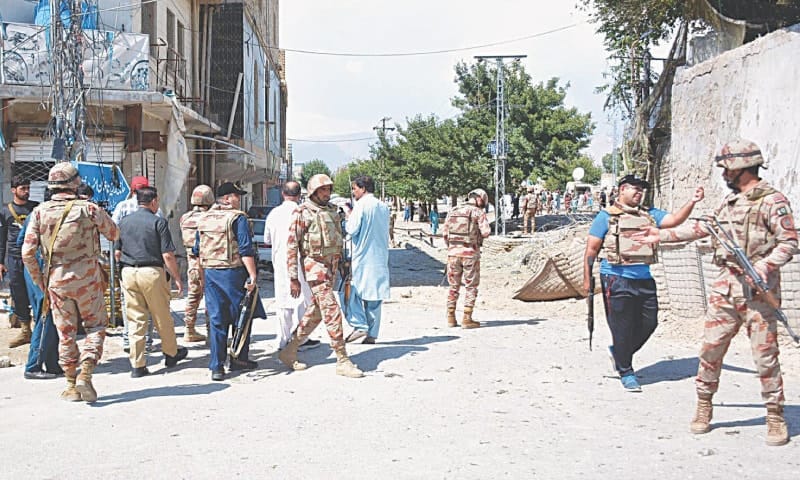
Saleem Shahid and Amjad Mahmood report for Dawn that One person was killed and four others were injured in bomb blasts in Quetta and Bajaur on Sunday. On the same day, Balochistan Chief Minister Sarfraz Bagti denied any operation was going on in the province and ruled out talks with anyone who “doesn’t respect the Constitution”. According to officials, the blast in Quetta took place close to a Frontier Corps checkpoint near the Chaman railway crossing gate, a high-security area. A senior police officer said an improvised explosive device (IED) was planted at the back wall of the checkpoint, which exploded with a loud bang.
Insurgents free four people from former stronghold of Pakistani Taliban
Voice of America reports that insurgents freed four people Saturday, including an army officer who was abducted three days ago from a former stronghold of the Pakistani Taliban, the military said. Lieutenant Colonel Khalid Ameer was seized Wednesday while sitting in a mosque to receive mourners after attending his father's funeral, according to local police. The "unconditional release" of Ameer and three of his relatives was secured due to the role played by tribal elders and "all the abductees have safely returned home," the military said in a statement without giving any further details.
Afghanistan Update
‘Frightening’ Taliban law bans women from speaking in public
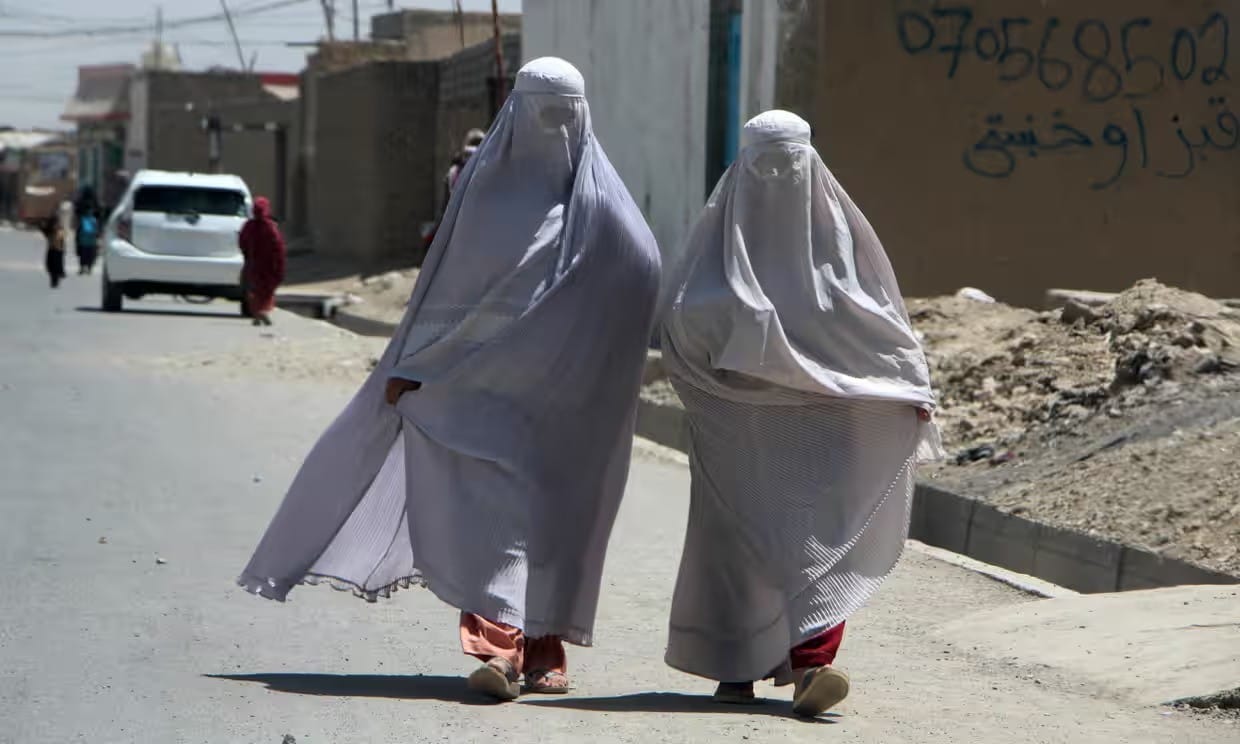
Annie Kelly and Zahra Joya report for The Guardian a new Taliban laws that prohibit women from speaking or showing their faces outside their homes have been condemned by the UN and met with horror by human rights groups. The Taliban published a host of new “vice and virtue” laws last week, approved by their supreme leader Hibatullah Akhundzada, which state that women must completely veil their bodies including their faces, be in thick clothing at all times in public to avoid leading men into temptation and vice. Women’s voices are also deemed potential instruments of vice and so will not be heard in public under the new restrictions. Singing or reading aloud, even from inside their houses, was prohibited. The restrictions have been condemned by Roza Otunbayeva, the special UN’s representative for Afghanistan, who has said they extend the “intolerable restrictions” on the rights of women and girls already imposed by the Taliban since they took power in August 2021.
Germany deports 28 Afghans for first time since 2021 Taliban takeover
Al Jazeera reports that Germany has deported 28 Afghan nationals charged with criminal acts, in the first such move since the Taliban returned to power in Afghanistan in 2021. The Qatar Airways charter jet carrying the deportees departed for Kabul at 6:56 am (04:56 GMT), according to the Ministry of Interior in the eastern state of Saxony. The men had been brought from across the country to Leipzig for the flight. Sources confirmed to the German news agency dpa that all the Afghan citizens on board the flight were men. The government had to work through other channels to secure the deportation as Germany cut diplomatic ties with the Taliban government since the ousting of then-President Ashraf Ghani in a stunning power grab three years ago.
Bangladesh De/Cypher
2 September, 2024
Economy
Bangladesh Receives Over $2 Billion in Remittance in August
The Business Standard reports that Bangladesh received $2.07 billion in remittance through formal channels in August 2024, a significant increase from $1.43 billion during the same period in 2023. The surge follows a decline in July, when remittances fell to $1.91 billion due to disruptions caused by a student movement and internet shutdowns. Bangladesh Bank has implemented measures to boost remittance inflows to address the foreign exchange crisis.
Workers Unrest: Production Shuts at 10 RMG, 20 Pharma Units
The Daily Star reports that production at 10 garment and 20 pharmaceutical factories near Dhaka has stopped amid workers' protests for better pay, regularisation, and a two-day weekend. The unrest has led to road blockades in areas like Savar, Ashulia, and Gazipur. Factory managements are negotiating with workers but have faced difficulties in meeting demands swiftly, risking prolonged disruptions in the supply chain.
CID Investigating Money Laundering Charges Against Beximco Group
bdnews24.com reports that the Criminal Investigation Department (CID) of Bangladesh has launched an investigation into allegations of money laundering and fund smuggling involving Beximco Group, a business conglomerate owned by Salman F Rahman, the former advisor to Sheikh Hasina. The probe, initiated under the Money Laundering Prevention Act, follows claims that Beximco took out fraudulent loans totalling Taka 334.7 billion from several banks and smuggled funds abroad through over-invoicing and under-invoicing schemes.
Internal Politics
Chief Adviser to Sit with Major Political Parties Today
risingbd.com reports that Professor Muhammad Yunus, Chief Adviser of Bangladesh's interim government, will meet with the country's major political parties today to discuss electoral issues and reforms. The meeting, set to take place at the State Guesthouse Jamuna, follows demands from the BNP for a clear election roadmap. This dialogue is part of ongoing efforts to address political reforms and ensure a fair electoral process.
Rallies Banned Near Chief Justice's Residence, Supreme Court Gate
Dhaka Tribune reports that the Dhaka Metropolitan Police (DMP) has imposed a ban on all meetings, rallies, processions, and demonstrations around the chief justice's residence, the Judge's Building, the Judges' Complex, the Supreme Court gate, and the adjacent road to Matsya Bhaban. The ban, announced under Section 29 of the DMP Ordinance, will remain in effect until further notice to maintain public order and safety in the area.
Doctors Call Off 'Shutdown' Till 8pm Monday
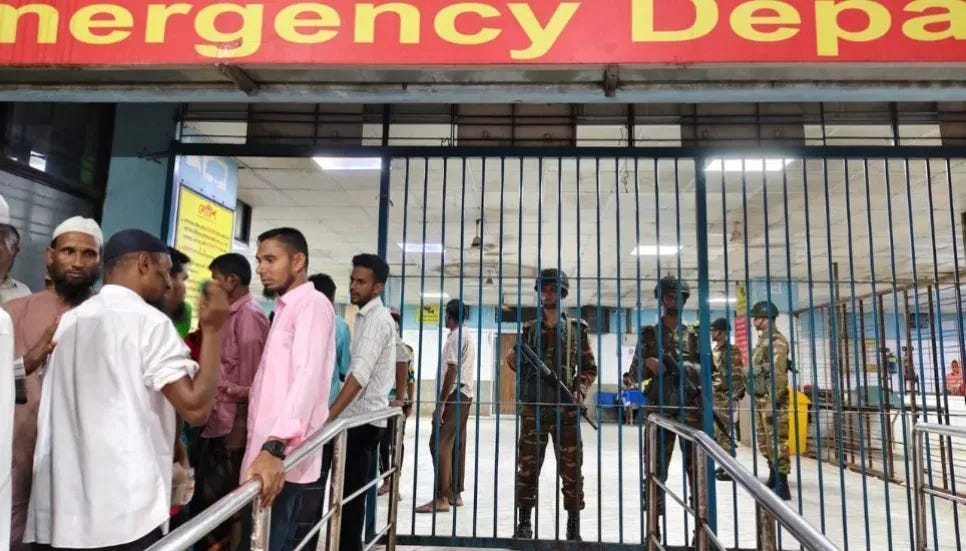
The Business Post reports that doctors in Bangladesh have called off their indefinite shutdown until 8 pm on Monday following an assurance from Health Adviser Nurjahan Begum to arrest those involved in an attack on physicians at Dhaka Medical College Hospital (DMCH). The shutdown was initially declared in response to assaults on doctors and vandalism by relatives of a patient. Two probe bodies have been formed to investigate the incidents and allegations of negligence in treatment.
Intense Fighting in Maungdaw Raises Fresh Rohingya Influx Fears
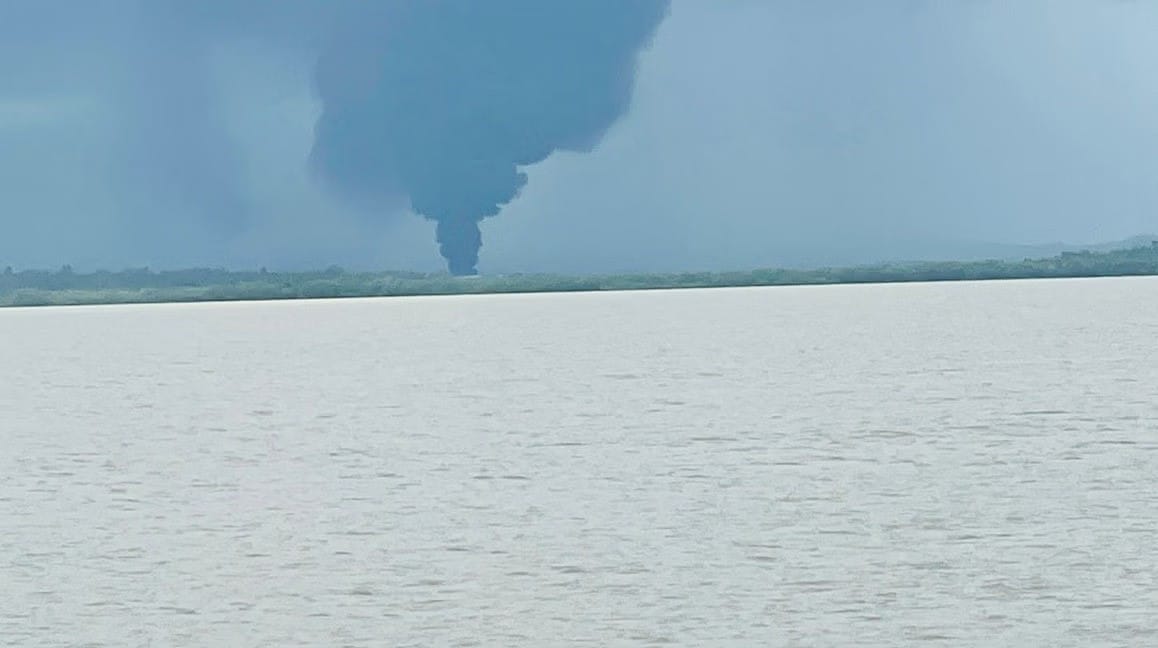
The Daily Star reports that fears of a new influx of Rohingya refugees into Bangladesh have grown as fighting intensifies in Myanmar's Maungdaw Township, near the Teknaf border. Explosions and aircraft have been heard across the border, and reports suggest both the Arakan Army and Myanmar Junta are using Rohingyas as human shields. Recent violence, including a drone attack killing 200 Rohingyas, has already forced an estimated 10,000 refugees to flee to Bangladesh. The Border Guard Bangladesh remains on high alert to prevent further crossings.
Bangladesh and the World 🌐
Chief Adviser to Attend UNGA, Confirms Foreign Affairs Adviser Touhid Hossain
Prothom Alo reports that Dr Muhammad Yunus, Chief Adviser of Bangladesh's Interim Government, will attend the 79th United Nations General Assembly (UNGA) later this month, as confirmed by Foreign Affairs Adviser Md Touhid Hossain. The visit is expected to be brief, with potential sideline meetings. The departure date has yet to be finalised. Hossain also addressed topics including Sheikh Hasina's status in India and recent MoUs with India.
Prof Yunus Seeks Canadian, UNDP, Malaysian Support to Boost Economic Development, Reform Judiciary
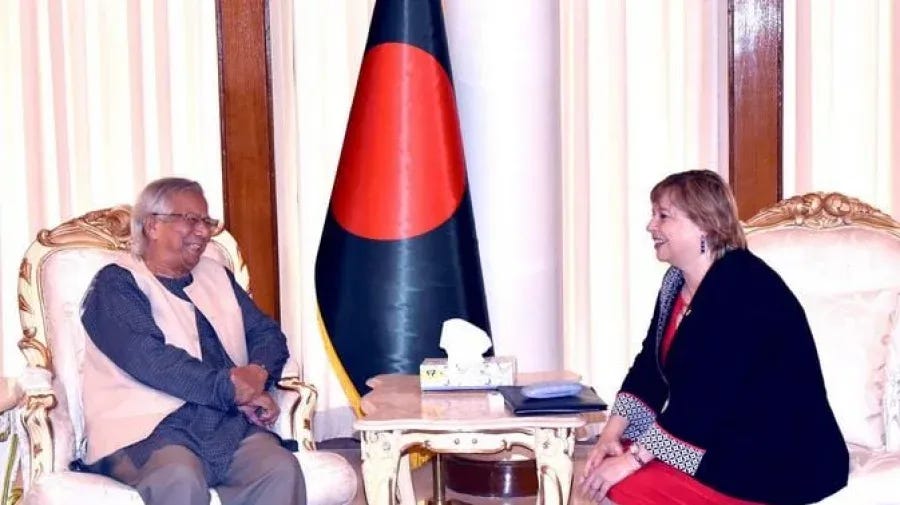
Bangladesh Post reports that Chief Adviser Prof Muhammad Yunus is seeking support from Canada, the UNDP, and Malaysia to boost economic development and reform the judiciary in Bangladesh. During meetings with diplomats, Prof Yunus urged Canada for significant investments to help rebuild the economy and discussed judicial reforms with the UNDP. He also sought Malaysia’s support for Bangladesh’s potential membership in ASEAN, highlighting Bangladesh's role as a bridge between ASEAN and SAARC.
Erdogan Greets Yunus, Offers Turkish Assistance for Flood Victims
Daily Observer reports that Turkish President Recep Tayyip Erdogan congratulated Professor Muhammad Yunus on his new role as head of Bangladesh's interim government and offered humanitarian aid for the flood-affected people. During a call, Erdogan expressed condolences for the loss of lives due to recent floods and proposed increased trade and investment between Turkey and Bangladesh. He also invited Yunus to visit Turkey, an offer Yunus accepted, while Yunus invited Erdogan to visit Bangladesh, which Erdogan also accepted.
Envoy: Australia to Donate AUS $1 Million for Bangladesh’s Flood-Hit People
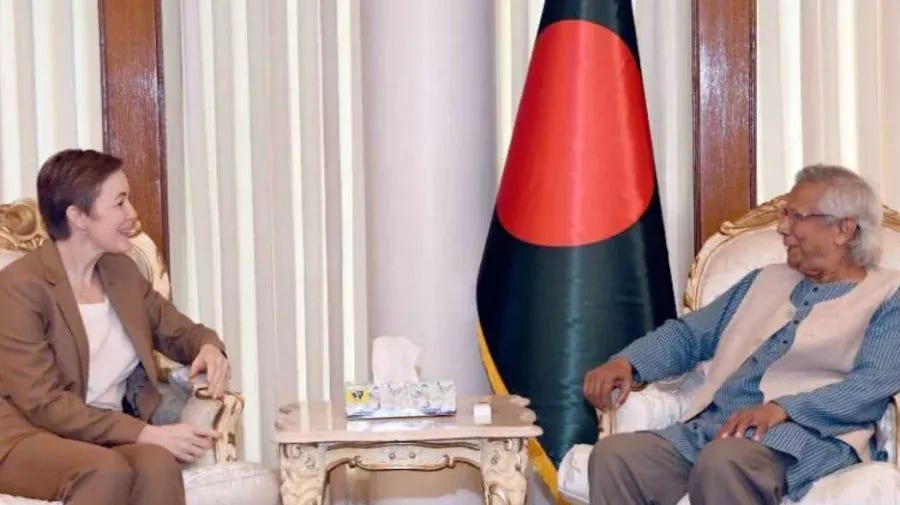
Dhaka Tribune reports that Australia will donate AUS $1 million to support flood-affected people in Bangladesh, as announced by Acting Australian High Commissioner Nardia Simpson during a meeting with Chief Adviser Dr Muhammad Yunus. The meeting also addressed issues such as the security of the Bay of Bengal, the Rohingya crisis, human rights, and economic cooperation. Simpson highlighted Australia's commitment to peace-building and leadership initiatives in the Rohingya camps.
Russia to Give Bangladesh a Ship Full of Potash Fertiliser for Free
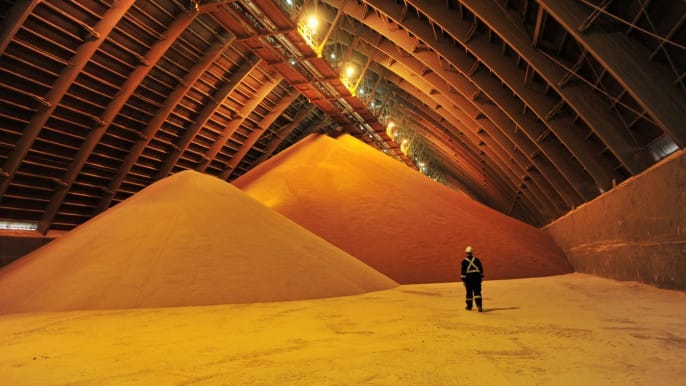
The Business Standard reports that Russia will provide Bangladesh with a ship carrying 30,000 tonnes of potash fertiliser for free, as announced by Russian Ambassador Alexander Mantytskiy during a meeting with Bangladesh's Home Affairs Adviser, Lt Gen (retd) Md Jahangir Alam. In response, the Bangladeshi adviser requested additional aid in the form of a ship full of wheat to support food security amid current economic challenges and flooding. The meeting also touched on enhancing cooperation in cybersecurity and forensic lab capacity building.
Chinese Ambassador Seeks Security for 9,000 Citizens Living in Bangladesh
The Daily Star reports that Chinese Ambassador to Bangladesh Yao Wen has requested enhanced security for approximately 9,000 Chinese nationals residing in various parts of Bangladesh. The request was made during a courtesy meeting with Home Adviser Lt Gen (retd) Jahangir Alam Chowdhury at the secretariat. The Home Adviser assured the ambassador of Bangladesh’s commitment to ensuring the safety of all Chinese citizens in the country and also sought Chinese assistance for flood-affected areas in Bangladesh.
Home Adviser Seeks UK Support for Police Reform
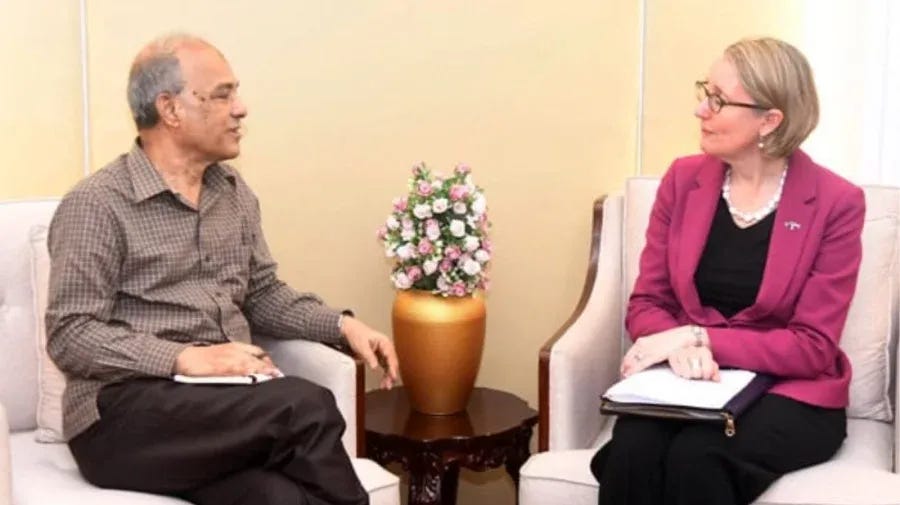
Daily Sun reports that Lt Gen (retd) M Jahangir Alam Chowdhury, Home Affairs Adviser of Bangladesh's interim government, has sought the United Kingdom's assistance in reforming the police force to make it more skilled, unbiased, and people-friendly. During a meeting with British High Commissioner Sarah Cooke, the UK envoy assured support, including sending a team of experts to Bangladesh next month. Discussions also covered issues like combating terrorism, illegal migration, flood rehabilitation, and Rohingya repatriation.

Rest of World
HEADLINES
Israelis erupt in protest to demand a cease-fire after 6 more hostages die in Gaza
Tens of thousands of grieving and angry Israelis surged into the streets Sunday night after six more hostages were found dead in Gaza, chanting “Now! Now!” as they demanded that Prime Minister Benjamin Netanyahu reach a cease-fire with Hamas to bring the remaining captives home. (AP)
Azerbaijan's ruling party on course for one-seat majority in election, exit poll says
Azerbaijan's ruling party was on course for a single-seat majority on Sunday in a snap parliamentary election called by President Ilham Aliyev, according to an exit poll. (Reuters)
Beluga whale alleged to be Russian ‘spy’ found dead in Norway

A beluga whale nicknamed Hvaldimir, first spotted in Norway not far from Russian waters while wearing a harness that prompted rumours he might be a spy for Moscow, has been found dead. (The Guardian)
Germany’s Scholz says worried by far-right surge in general election
German Chancellor Olaf Scholz called the results of two regional elections that saw big wins for the far-right AfD and losses for his coalition “bitter” and urged mainstream parties to form governments without “right-wing extremists.” (Al Arabiya)
--


